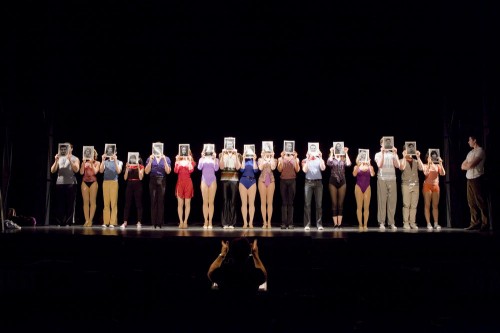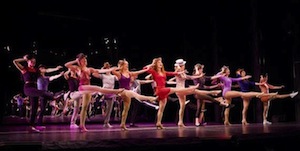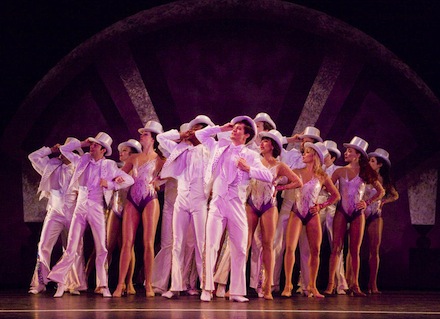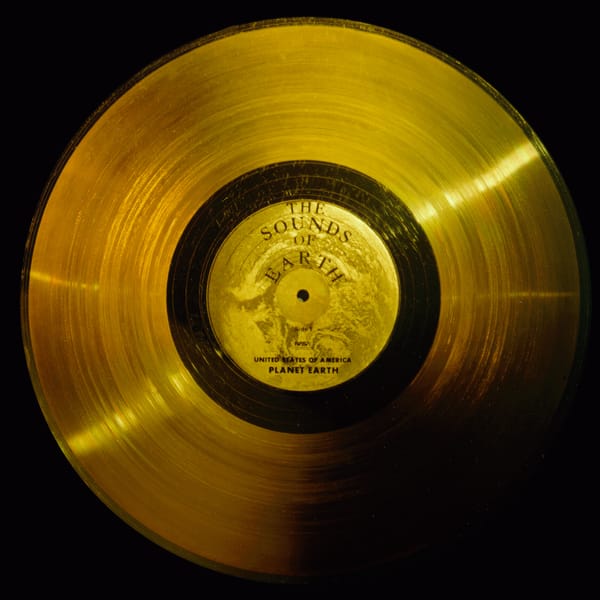
It’s always reassuring to see a completely bare backstage wall in any production of A Chorus Line. Basically, if you can’t get the nothingness right and demonstrate that you’re not hiding anything (with curtains, say, or a completely darkened stage), or if you gussy it up with too much detail, you’re sunk. (The 1985 film version is a perfect example of how to screw things up from the start). Right off the bat, even before anyone's even made it onstage, it’s a relief to see that Berkshire Theatre Group's revival (running through July 21 at The Colonial Theatre in Pittsfield), directed by Eric Hill and touchingly acted by an ensemble of 19, doesn’t make this error. Once things get going, with the inner monologue dance number “I Hope I Get It,” I couldn’t help wondering: Who knew it was such a good time to revive A Chorus Line? For some time now the 1975 show, directed by the late, great Michael Bennett, with music by Marvin Hamlisch and lyrics by the also sadly late Ed Kleban, seemed a victim of its longevity; once Broadway’s longest running musical, its freshness and originality had faded long before its first run's end. As mentioned before, the film version (directed by Richard Attenborough, of all people) seemed to bring the show into the permanently overexposed/overhyped category. Songs like “What I Did For Love” or “One” eventually solidified in the memory bank somewhere in between “Memories“ or (more relevantly) “The Way We Were.” Compare this to a musical like Follies, which Bennett co-staged and choreographed only a few years before; while it never succeeded financially, even in its recent Broadway incarnation, its artistic reputation seems to grow by the decade, and justifiably so.

What soon becomes apparent in this thrilling and moving revival, directed with terrific know-how and briskness by Hill (with strong Bennett-like choreography by Gerry McIntyre), is that the “tell it like it is” rap-session/ consciousness-raising zeitgeist of the '70s from which it originally sprang suddenly feels relevant again, particularly in contrast to the disingenuous, egoistic period in which we currently find ourselves, both in the media and in cultural and political spheres. What once seemed aggressively, even tiresomely, “honest” is now, in a production that gets just about everything right, compassionately true to life and excitingly theatrical at the same time. When A Chorus Line first opened, audiences — even critics — were astonished by the combination of its echt 1970s “Be yourself, drop the attitude” attitude and the brilliant showmanship of Kleban, Hamlisch, and, most of all, Bennett, arguably musical theater's greatest director. What Bennett created with all parties (including book writers James Kirkwood and Nicholas Dante) was an ironic melding of splayed human emotion and Broadway razzmatazz, a skillful proclivity he picked up while working with the great Hal Prince and Stephen Sondheim on Company and Follies. There were a few naysayers, such as Sondheim himself, who said at the time (perceptively, if a bit peevishly) that the show was just one of a long line of professional works of drama, musical and otherwise, by people like Bob Fosse and Elia Kazan. But the Sondheim influence is there (most helpfully in the atypically dramatic Hamlisch score) and the effect on nearly everyone else was overwhelming. I recall the excitement of an exceedingly precocious, sophisticated, and prematurely jaded friend who was head usher at the Public Theater when the show had its Off-Broadway opening there. At 17 he had seen and done everything, but admitted that he could barely describe his gratitude for having been able to see the show and witness theatrical history in the making quite so intimately. (I had to wait for a mezzanine seat at the Schubert almost a year later).

Dramatizing the lives of gypsies, people that audiences see smiling onstage but knew nothing about— and in a form that these ostensibly “cheery” creatures knew how to do professionally least well of all, ie. talking about themselves — is indeed one of the layers of clever theatrical concepts that still makes this show so novel. But what seems clearer today than it was previously is the pure, compassionate spirit that drives its story line. Unlike so many other backstage dramas, A Chorus Line is a showbiz drama about real things like survival, worry, and fear of the future, rather than the usual topic, both of this genre and of the current culture today — fame. The one character who attains a little of it, Cassie (originally played by Donna McKechnie and now, avidly, by Nili Bassman) is presented as a cautionary tale. Compare that to Glee, Smash — or The Real Housewives of Beverly Hills for that matter! Much of this genuine feeling is perhaps due to the show’s humble origins in the cramped apartments of real Broadway “gypsy” dancers, many of whom practiced a sect of Buddhism that had become popular with actors and dancers at the time. After chanting (nam myoho renge kyo), Buddhists such as Dante (the model for the character of Paul, played in this production by Eddie Gutierrez, who somehow manages to bring one to tears just by standing there), actor Robert Lupone (who originated the role of Zach, now acted with exceeding prescence by Noah Racey), and dancer Michon Peacock, would sit around and talk about their problems and worries. Peacock formed these Buddhist rap sessions into several taped workshops, which were attended by Bennett. What the show got from its origins, as Bennett must have realized, was incalculably valuable and lasts to this day, both as dramatic fodder and as an artistic statement: that a musical could be a serious format for bringing contemporary people, with all their struggles, to vastly entertaining theatrical life. So long, of course, as they were interesting people, which no doubt he thought they were (being one of them). It’s odd, but all of these spiritual, heart-racing, life-and-death, show bizzy things came to mind while watching this lovely production: what was, what happily can be again. Seeing such a good A Chorus Line at this late date is an experience that could make anyone believe in reincarnation. But its run only goes through July 21 so make sure to get tickets ASAP. You may not see its like for another 40-odd years. —Scott Baldinger

Berkshire Theatre Group's Revival of A Chorus LineThe Colonial Theatre, Pittsfield, MA Conceived and originally directed by Michael Bennett, with music by Marvin Hamlisch and lyrics by Ed Kleban Directed by Eric Hill Featuring Eric Gutierrez, Noah Racey, and Nili Bassman Now through July 21 Related: Benefit performance by the original "Cassie"Donna McKechnie: My Musical Comedy LifeJuly 28, 8 p.m. at The Colonial Theatre To honor the late Larry Vaber, former board member of Berkshire Theatre Festival, and support the work of BTG's Unicorn Stage Related: A Class ActA tribute to Edward Kleban, one of the collaborators of A Chorus Line. July 14 - August 4 at the Berkshire Theatre Group's Unicorn Theatre, Stockbridge.








